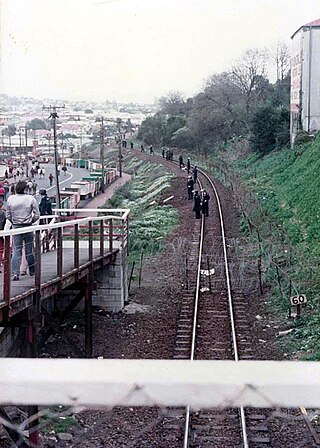
The 1981 South African rugby tour polarised opinions and inspired widespread protests across New Zealand. The controversy also extended to the United States, where the South African rugby team continued their tour after departing New Zealand.
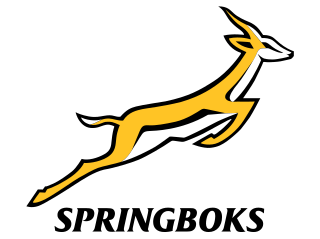
The South Africa national rugby union team, commonly known as the Springboks, is the country's national team governed by the South African Rugby Union. The Springboks play in green and gold jerseys with white shorts, and their emblem is the Springbok, a native antelope and the national animal of South Africa. The team has represented South African Rugby Union in international rugby union since 30 July 1891, when they played their first test match against a British Isles touring team. Currently, the Springboks are the reigning World Champions, having won the World Cup a record four times. South Africa are the only team to have won half of the Rugby World Cups they have participated in, and are also the second nation to win the World Cup consecutively.
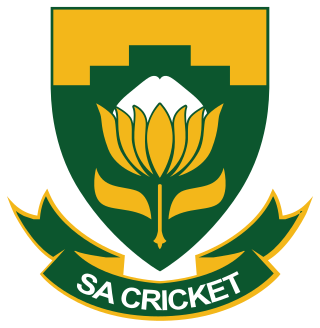
The South Africa women's national cricket team, nicknamed the Proteas, represents South Africa in international women's cricket. One of eight teams competing in the ICC Women's Championship, the team is organised by Cricket South Africa (CSA), a full member of the International Cricket Council (ICC).

Alvin Isaac Kallicharran is a Guyanese former cricketer who played Test cricket for the West Indies between 1972 and 1981 as a left-handed batsman and right-arm off spinner. He was a member of the squads which won the 1975 Cricket World Cup and the 1979 Cricket World Cup.
In 1980 the British Lions rugby union team toured South Africa. The tour was not a success for the Lions, as they lost the first three tests before salvaging some pride with a win in the fourth. The team did however win all their 14 non-international matches. The Lions were captained by Bill Beaumont.
Aron "Ali" Bacher is a former South African Test cricket captain and an administrator of the United Cricket Board of South Africa.

Halt All Racist Tours (HART) was a protest group set up in New Zealand in 1969 to protest against rugby union tours to and from South Africa. Founding member Trevor Richards served as president for its first 10 years, with fellow founding member John Minto then serving as president until South Africa dismantled apartheid in the early 1990s.

Rugby union in South Africa is a highly popular team sport, along with cricket and soccer, and is widely played all over the country. The national team is among the strongest in the world and has been ranked in at least the top seven of the World Rugby Rankings since its inception in 2003. The country hosted and won the 1995 Rugby World Cup, and won again in 2007, 2019 and 2023.
The 1971 South Africa rugby union tour of Australia was a controversial six-week rugby union tour by the Springboks to Australia. Anti-apartheid protests were held all around the country. The tour is perhaps most infamous for a state of emergency being declared in Queensland.
In total, around 700 people were arrested whilst the Springboks were on tour.

Sport has a significant role in South African culture. The three most popular mainstream sports in the country — cricket, football and rugby — reflect the country's early British colonial influence. South Africa was absent from international sport for much of the apartheid era due to sanctions, but started competing globally after the end of apartheid. South Africa is among a very few countries which have participated in world cups of all three major sports — cricket, soccer, and rugby union. England, Ireland, Scotland, Canada, New Zealand, and Australia are among other such nations. South Africa has hosted the 1995 Rugby World Cup, 2003 ICC Cricket World Cup and 2007 ICC World Twenty20, and 2010 FIFA World Cup.
The 1977 Commonwealth Heads of Government Meeting, officially known as the IV Commonwealth Heads Meeting, and commonly known as London 1977, was the fourth Meeting of the Heads of Government of the Commonwealth of Nations. It was held in London, United Kingdom, and was hosted by that country's Prime Minister, James Callaghan. President Idi Amin of Uganda did not attend, and on the eve of the meeting President James Mancham of the Seychelles was overthrown in a coup d'état and the country was not represented.

South Africa under apartheid was subjected to a variety of international boycotts, including on sporting contacts. There was some debate about whether the aim of the boycott was to oppose segregation in sport or apartheid in general, with the latter view prevailing in later decades. While the National Party introduced apartheid in 1948, it added sport-specific restrictions from the late 1950s, on interracial sport within South Africa and international travel by nonwhite athletes. The international federations (IFs) governing various sports began to sanction South Africa, both in response to the new restrictions and in reflection of the broader anti-racism of national federations in newly independent postcolonial states. By the early 1970s, South African national teams were excluded from most Olympic sports, although South Africans competed in individual events in some, mainly professional, sports through the 1980s. Although from the mid-1970s the National Party relaxed the application of segregation provisions in relation to sport, this failed to alleviate the boycott, which continued until the end of apartheid.

Foreign relations of South Africa during apartheid refers to the foreign relations of South Africa between 1948 and 1994. South Africa introduced apartheid in 1948, as a systematic extension of pre-existing racial discrimination laws. Initially the regime implemented an offensive foreign policy trying to consolidate South African hegemony over Southern Africa. These attempts had clearly failed by the late 1970s. As a result of its racism, occupation of Namibia and foreign interventionism in Angola, the country became increasingly isolated internationally.
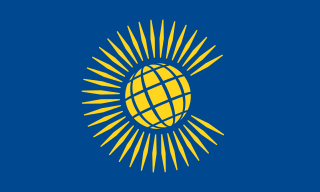
The Commonwealth of Nations, often simply referred to as the Commonwealth, is an international association of 56 member states, the vast majority of which are former territories of the British Empire from which it developed. They are connected through their use of the English language and historical-cultural ties. The chief institutions of the organisation are the Commonwealth Secretariat, which focuses on intergovernmental relations, and the Commonwealth Foundation, which focuses on non-governmental relations between member nations. Numerous organisations are associated with and operate within the Commonwealth. It is known colloquially as the British Commonwealth.
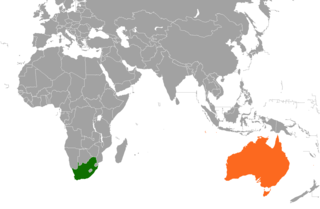
The Commonwealth of Australia and the Republic of South Africa formally established diplomatic relations in 1947. Australia is home to one of the largest South African communities abroad with approximately 189,230 South Africans living in the country. Both countries are members of the Cairns Group, Commonwealth of Nations, G20, Indian Ocean Rim Association and the United Nations.

The contest between The Wallabies and The Springboks is one of the major rivalries in rugby union. Since 2000s, the two teams have competed for the Mandela Challenge Plate.

Netball is one of the most popular women's participation sports in South Africa. The sport is also played by a large number of men. It exists in a culture where sport plays an important public and social part of life. The history of South Africa's netball involvement mirrors that of other sports played in the country like rugby union. During the apartheid era, there were many netball facilities available for whites to use, and fewer for people from other race groups. Funding issues and gender issues did not help bridge this gap.
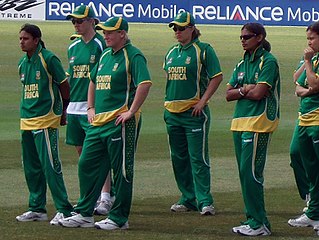
The South Africa women's national cricket team has represented South Africa in international women's cricket since 1960, when they hosted England, contesting four Test matches. Their next officially recognised series was against New Zealand, more than eleven years later. In 1977, they were excluded from competing in international sporting events, when the Commonwealth of Nations signed the Gleneagles Agreement as part of the international campaign against apartheid. Although the men's national team returned to international cricket in 1991, the women's team did not compete again until 1997, when they toured Ireland and England. Since then, the team has played regularly in One Day Internationals (ODI). The introduction of Twenty20 cricket in the early part of the 21st century has all but eliminated Test cricket from the woman's game. South Africa have played five Test matches since their return, and 71 Twenty20 Internationals (T20I) since their first such contest in 2007.
South Africa did not compete at Olympic Games from 1964 to 1988, as a part of the sporting boycott of South Africa during the apartheid era. The South African National Olympic Committee (NOC) was expelled from the International Olympic Committee (IOC) in 1970. In 1991, as part of the transition to multiracial equality, a new NOC was formed and admitted to the IOC, and the country competed at the 1992 Summer Olympics held in Barcelona.

Rugby union and apartheid had a complex and supportive relationship. From 1948 to 1994, international rugby relations with the country, and also the non-integrated nature of rugby within South Africa drew frequent controversy. South Africa remained a member of the International Rugby Board (IRB) throughout the apartheid era.











